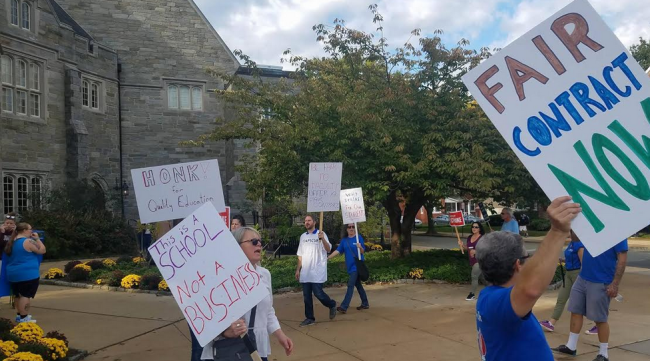You have /5 articles left.
Sign up for a free account or log in.

Picket line at West Chester University
Christopher Thornton
Faculty members from 14 public campuses in Pennsylvania went on strike Wednesday after contract negotiations came to a halt, leaving more than 100,000 students without classes.
The faculty union at the Pennsylvania State System for Higher Education had been working without a contract since June 2015 -- 477 days -- and contentious negotiations that lasted for longer than a year ended without success Tuesday night. The system administration offered the union what it called a “last best offer” of a contract, and union officials were not satisfied.
“[System administrators] put the last offer on the table and then walked away,” said Andy Famiglietti, an associate professor of English at West Chester University, part of the system.
But the negotiating team didn't go home, said Kenn Marshall, media relations manager for the system. Instead, state system negotiators walked back to their room, where they stayed until 5 a.m. Union negotiators did the same, but they attempted to continue to bargain through back channels because it seemed clear that the negotiators in the other room were finished with the discussion, according to Kenneth Mash, president of the Association of Pennsylvania State and College and University Faculties.
The result: before dawn on Wednesday, professors were preparing to picket.
The center of the controversy surrounded pay for faculty members -- both tenured and adjunct -- and health benefits, said Mash.
The state system backed off on some measures, such as increasing the number of classes adjunct faculty members would teach and increasing the cap on the number of adjunct faculty from 25 percent to 30 percent, which Mash said would’ve cut adjunct pay by keeping their pay the same as they taught more courses. Union members criticized the university for not bending far enough on other issues, such as increasing faculty pay and offering better health coverage.
"We made some real progress until early Saturday and then we hit a dead end when we hit issues of wages and benefits,” Mash said.
As a part of the most recent contract offer, system negotiators offered a health care plan identical to the plans other system employees participate in and pay raises that ranged from 7.25 to 17.25 percent over the next three years for full-time faculty and 1 percent per year for adjunct faculty.
The health insurance plan, which would require faculty to pay new deductibles, higher premiums and higher drug co-payments, would save the system $22 million over the next three years, Marshall said. System officials have said that they have no choice but to limit spending in light of tight state budgets.
It’s not clear how many faculty members are participating in the strike, but many students reported on social media that their classes were not being taught. The union represents about 5,500 faculty members and coaches in the Pennsylvania higher education system who are under the contract negotiated by the union. This is the union's first strike, but it’s historically had a rocky relationship with the state system.
The state system has no intent to replace faculty with administrators or temporary teachers, Marshall said, but the administration plans on ensuring that students will make up the classwork that they missed due to the strike.
Although students were instructed by administrators to attend class Wednesday despite the circumstances, striking professors told their students otherwise.
Some students expressed support for the faculty union, including students at West Chester University, the largest campus in the system. They cheered for faculty and chanted “Students for faculty!” and “Hey, hey! Ho, ho! Chancellor Brogan’s got to go!” -- a reference to Chancellor Frank Brogan.
Rebecca McCabe, a junior at West Chester, had time to livestream the walkout after her Business and Organizational Theory class was canceled. She didn’t head to class at all, despite an email from West Chester’s interim president telling the student body to show up.
“I’m for the union,” McCabe said. “The professors need what they deserve -- fair pay and fair benefits.”
Other students are concerned about wasting their tuition dollars and graduating on time.
Union members contend that these drawn-out contract negotiations are ultimately about providing better education for their students.
“This is really about academic quality issues,” Mash said. “We don’t want to devalue faculty teaching.” He cites disputes (some of which have been resolved in the negotiations) over professional development, faculty research, less reliance on long-term faculty and shifts to more online education.
Governor Tom Wolf weighed in, too, criticizing both the union and the administration in a statement.
“I am extremely disappointed in the failure of [the Pennsylvania State System for Higher Education] and [the Association of Pennsylvania State and College and University Faculties] to reach an agreement on a contract. The resulting strike is detrimental to the system and will have far-reaching effects for years to come,” the statement said.
Both sides agree on one point: public universities in Pennsylvania do not get enough funding from the state.
Although the governor noted that funding for education has increased 7.5 percent under his watch, states have generally slashed the amount of money they give to public universities, and Pennsylvania is no different. Pennsylvania actually decreased funding for higher education in the last academic year, and it was ranked 49th in higher education support per capita in 2014.
It’s also unclear to all parties how long this strike will last. As of 5 p.m. Wednesday, Mash said that he hadn’t heard from administrators about continuing negotiations since the strike began.
“There's no specific time or date set, but we are interested in continuing negotiations for the benefit of our students,” Marshall said. “I think that will occur very soon.”
When asked how the strike would affect students’ education, Mash said without hesitation, “If we don’t get this done in the next couple of days, shame on us.”




